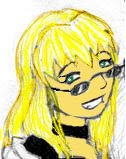
Or "Things That Are Important to a Mage: Summer Sky."
I'm afraid I don't have just a whole lot to say about this anime currently airing in Japan. It's rather subdued and slow. In fact it's extremely simplistic when put up alongside all the flashier shows running right now. That's not to say it's a bad show, because if you like slow moving, quiet stories, then it will probably be fine for you. If anything, check it out for it's production style, which is pretty interesting. I'm not sure how it's done exactly, but (particularly) during outdoor scenes, it looks as if the characters are being animated in front of a real life photograph (which may just be a highly realistic painting).
Mahou Tsukai ni... is a magic girl story - like Someday's Dreamers, not like Sailor Moon. And for good reason. Mahou Tsukai ni Taisetsu na Koto should sound familiar, as it is the Japanese title for Someday's Dreamers. Natsu no Sora is created by Norie Yamada, who wrote the Someday's Dreamers manga. They're produced by different studios, but both aired on TV Asahi, and, as a bonus, both have music by Takefumi Haketa.
A basic description of Natsu no Sora would be similar to a description of Someday's Dreamers, minus the teeny bopper bubblegum pop feel of the previous show (which caused me to dislike it so much).. Sora is a teen mage from a family of mages (her father, at least, who is dead), and now that she is 16, she is being sent to Tokyo to go to magic school. Sora lives in a small area of Hokkaido, where her family owns a farm, so she's unused to large city life. She moves in with a mentor mage, in a house with another student mage named Gouta Midorikawa. Sora is very adept at magic, and can already cast powerful spells, but Gouta hasn't been able to use much (if any) magic at all. Gouta is a bit older as well (Sora is about 16, but I'd say Gouta isn't any older than 20, and is probably more around 18). He's frustrated and a bit embarrassed that he can't use magic, and therefore keeps to himself and doesn't really associate with the others in his class. Rather cold and distant. Until Sora comes along.
I'm 3 episodes in and...well...the story hasn't really progressed much. The way the mage system works here is similar to how it runs in Someday's Dreamers. People send in a request, and mages are dispatched. Sora (similar to SD's Yume) is not content to simply cast the requested magic, but feels she must help her customer beyond a simple spell. Her approach is different; she's a vastly different sort of character than Yume was, though there are similarities. Though the presentation and production of the show is what really makes it a different series.
The animation is simple, but it's fitting. And the opening and closing songs are quite nice as well. I know at least one of you is a Someday's Dreamers fan (or enjoyed it, at least), and anyone else who liked it should check out the new show. If anyone else is interested in a quiet little show devoid of the flashy colors, crazy action sequences and giggling moe girls that are rampant these days, then it might not be a bad idea to check it out. It's very slice of life, which can be rather boring for some, but like I said, if you want a break from everything else out there, it's not too bad.
Sora and Gouta in the image above.
